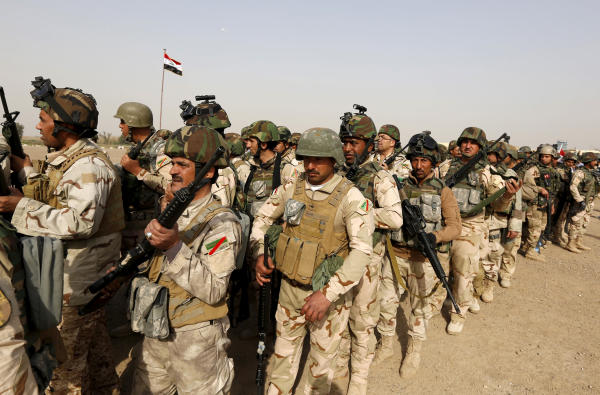U.S. Secretary of State John Kerry, in an announcement made on Wednesday, said that the battlefield momentum in Iraq and Syria has shifted against ISIS but the international community must now also confront the challenge of stabilizing newly liberated areas.
“The momentum has shifted,” Kerry told an international conference to raise funds for Iraq.
“The new challenge that we face is securing and aiding for the recovery of a liberated area.”
The Anbar Salvation Council had reported in June a series of violations and sectarian-fueled assaults. Popular Mobilization Forces (PMF) militias were accused of carrying out the crimes after the city was made ISIS-free.
Vice President to the Anbar Salvation Council and head of the governorate security committee Faleh al-Issawi had told Asharq Al-Awsat newspaper that eye witnesses informed the council of several crimes and violations PMF militants staged against a number of different civilian Fallujah neighborhoods.
Residents reported that as army, tribal and police forces advance further leaving behind liberated territory, PMF militants roam free, committing crimes against Fallujah residents.
Issawi also cited that Fallujah mosques have been burned to the ground by militants. He added that militants’ presence in the process of freeing Fallujah was controversial to start with.
On that note, Lise Grande, the United Nations’ humanitarian coordinator for Iraq, warned that without addressing the needs of Iraqis displaced by the conflict, military victories will prove transient.
“The military campaign will have achieved a great short-term success, but perhaps little else of enduring impact,” she said.
The officials were speaking as defense and foreign ministers gathered in Washington to raise funding for Iraq and to agree on next steps in the fight against ISIS, in particular the militant group’s bastion in Mosul.
Kerry said the goal of the pledging session was to raise at least $2 billion in new aid for Iraq to help communities get back on their feet once Islamic State militants have been driven out.
The battle for Mosul is expected to be difficult, but the aftermath could be tougher, Iraqi, United Nations and U.S. officials say. Plans are still being finalized to provide urgent humanitarian aid and restore basic services and security for residents and as many as 2.4 million displaced people.
Defense ministers of the U.S.-led coalition against Islamic State were also meeting at Joint Base Andrews outside Washington, followed by a joint session of foreign and defense chiefs on Thursday to discuss the broader fight against ISIS not only in Syria and Iraq, but also Libya and recent attacks in Europe.
The United Nations is preparing for what it says will be the largest humanitarian relief operation so far this year as terrified people stream out of the path of the advancing Iraqi military and flee from the city itself. They will need shelter, food and water, and sanitation for three to 12 months, depending on the extent of the city’s destruction.
The vast majority of the expected refugees will be Sunni Muslims, many of whom feel disenfranchised by Iraq’s Shi’ite-led government in Baghdad, and that presents what could be an even bigger problem.
Mosul, which ISIS seized from a collapsing Iraqi army in June 2014, is Iraq’s second biggest city and home of Sunni Arabs.
Although Iraqi and U.S. officials have not announced a timetable for moving on Mosul, a senior Baghdad-based diplomat said Abadi wants to advance the start of the Mosul campaign to October after the seizure of Fallujah from ISIS last month.
This month, Iraqi forces backed by U.S. air power retook Qayara air base south of Mosul, which will be turned into a logistics hub for the main assault on the city.
The U.N. estimates that under a worst-case scenario, more than 1 million people could be displaced from Mosul and another 830,000 from a populated corridor south of the city, adding to the burden of caring for 3.5 million Iraqis already displaced.
